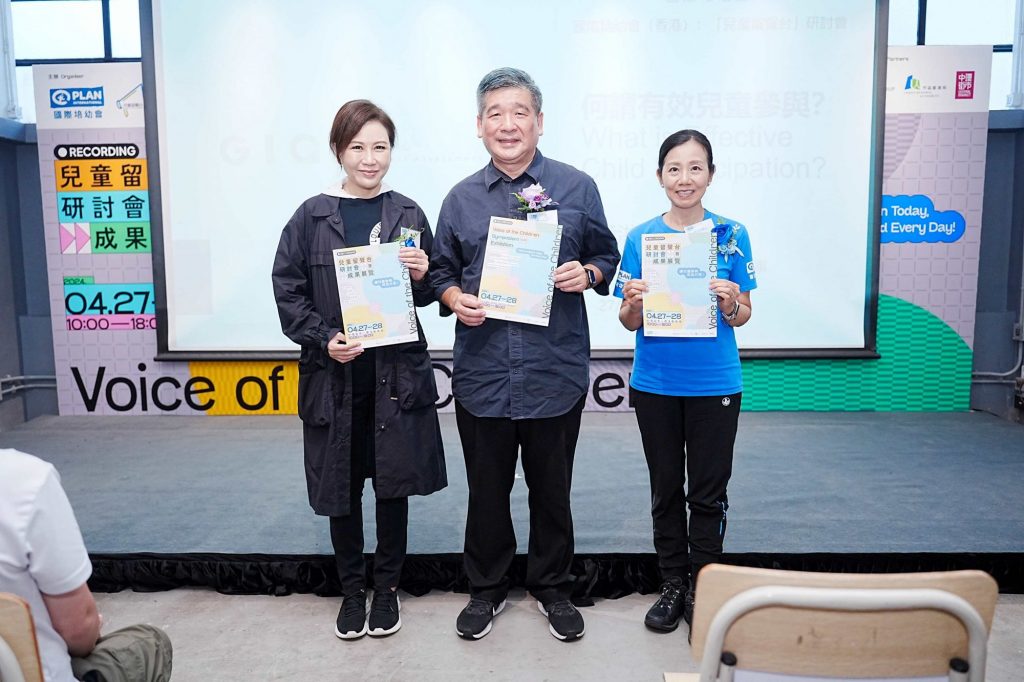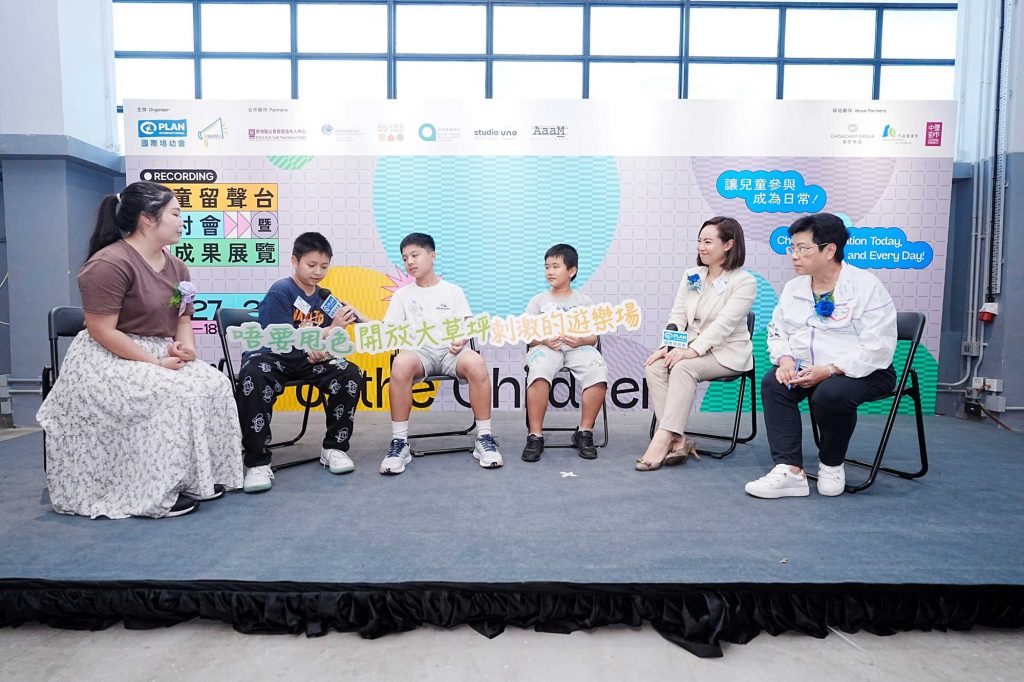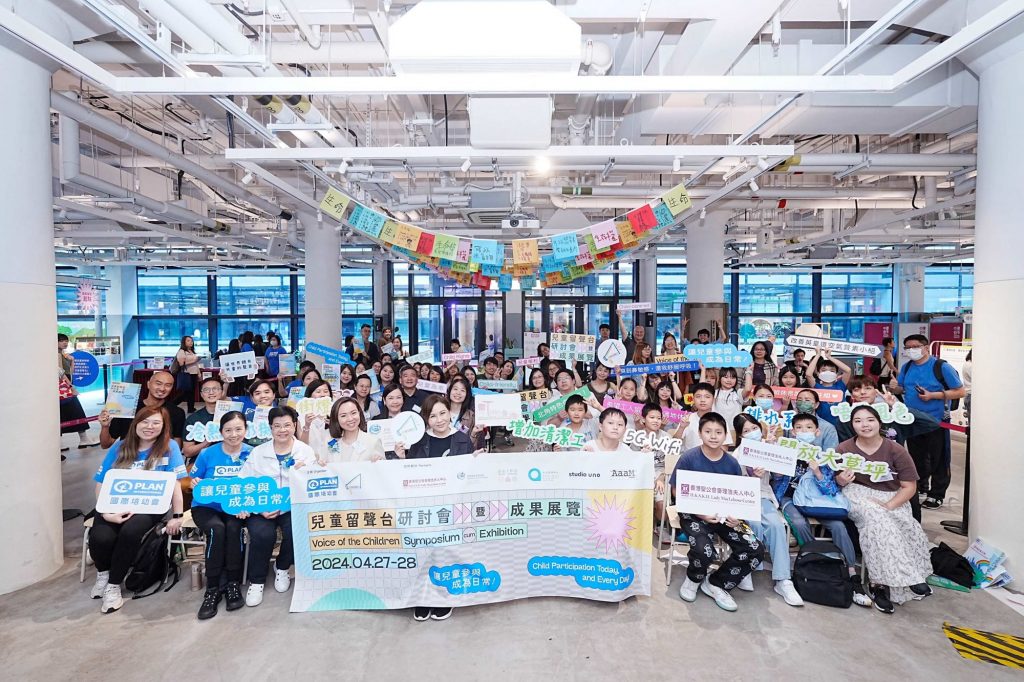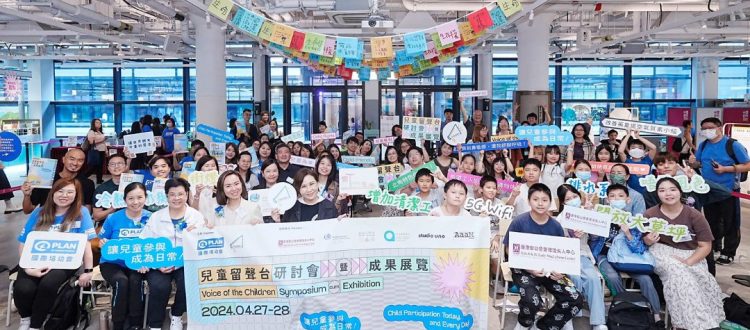The Launching of Hong Kong’s First Longitudinal Study Research on Child Participation Stipulated the Crucial Elements of Implementing a localized Child Participatory Model
According to the United Nations Convention on the Rights of the Child, a child’s right to participation is one of the basic rights and every child is free to express his or her views in all matters affecting them. For the past five years, Plan International Hong Kong (“PIHK”) has been encouraging children to participate in social affairs, work with different stakeholders and carry out advocacy through the child-centered “Voice of the Children” project (“VoC” project) with the partnership of local organisations, bringing about positive changes in the society with child-driven contributions.
Plan International Hong Kong carried out the Symposium cum Exhibition from 27 April to 28 April 2024 and released the findings of Hong Kong’s First Longitudinal Study Research on Child Participation. The organisation has commissioned the Good Impact Assessment Institute to carry out a monitoring and evaluation study on the “Child Participatory Community Development Programme” by performing 40 observations, and 32 groups and 3 in-depth individual interviews with 65 interviewees across 18 months. The research assessed the performances of partnering organisations, summarized the projected and non-projected outcomes, and the impacts on the society.
The Research illustrated the crucial elements of implementing a localized Child Participatory model. Value, Process and Environment should be the crucial elements of an effective child participation project. The child-centered project has to focus on enhancing social cohesiveness. As the project goes on, participating children will begin to be aware that they have the right to choose their level of participation. At the same time, the process of participation is more important than the result itself. The project should be process-oriented that strives to consolidate child-centered fulfillment. Partnering organisations should construct a supportive and inclusive environment so that every participant feels respected and accepted, enjoying the pleasure of joining the project.
The research also pointed out that child participation is beneficial to the participating children in terms of individual, collective and social levels. On the individual level, their confidence, expressiveness and self-autonomy were enhanced since they were able to engage in in-depth discussions and complete various tasks independently; the process of discussion and decision-making also nurtured their sense of responsibility. Collectively, the participating children’s interpersonal relationships improved immensely through group discussions. Not only did they carry out constructive talks, but they also learnt to express themselves while respecting others’ opinions, aiming to solve problems together. As the participating children had to work with adults during interviews and workshops, they displayed their well-developed self-esteem and communication skills. Regarding social development, their bonding and sense of belonging with the community was strengthened since they understood more about its culture and history and shared experiences with various stakeholders. They transformed into a citizen who could contribute to the society.
Plan International Hong Kong will continue advocating to the Government for a channel that allows an even greater extent of child participation so that children can voice out and participate in policy-making on the social issues that are close-linked to them. In the 2019 Policy Address, the Government called for public consultation on the renovation of 170 public play spaces under the Leisure and Cultural Services Department (“LCSD”). Through the “VoC” project, the child participants from the HKSKH Lady MacLehose Centre held discussions with the staff from LCSD and successfully executed the renovation of Shek Yam Road Rest Garden No. 3. Recently, the Housing Authority has carried out the “WELL • BEING” Public Housing Well-being Journey, aiming to improve the living environment of 24 public housing estates in five years. At the beginning, the Housing Authority collected residents’ opinions through surveys, workshops and booths. We are optimistic about children’s participation in the process. We hope that the Government could consider opening up opinion collection to the general public on issues related to public space renovation based on the above successful case.
Not only is child participation a project, but it is also the trust and support shown to children. We hope that child participation can be carried out every day in organizations, schools, families and communities. Adults should value children’s opinions and respect their rights to participation.

Plan International Hong Kong has commissioned the Good Impact Assessment Institute to carry out Hong Kong’s first longitudinal research on child participation with a monitoring and evaluation study, which was launched yesterday with suggestions on the crucial elements of implementing a localized Child Participatory model and conclusion of children’s progress on individual, collective and social levels. Ms. June Leung, Board Chair of Plan International Hong Kong (left), Dr Kanie Siu, Chief Executive Officer of Plan International Hong Kong(right), and Prof. Wong Hung, Founder and Director of Good Impact Assessment Institute (middle) joined the event.

The participating children, with the Hon Judy CHAN, MH, JP, Member of the Legislative Council of Hong Kong and Dr. Sandra Tsang Kit Man, JP, Board Member of PIHK cum Serving Member of the Commission on Children, shared their remarkable achievements with the public: 1) promoting the features of North Point’s community; 2) enhancing the rest facilities of domestic helpers; 3) improving North Point’s air quality; 4) announcing the “Ten Community Recreational Facilities Indexes”.

Plan International Hong Kong hopes that child participation can be carried out every day in organizations, schools, families and communities. Adults should value children’s opinions and respect their rights to participation.
